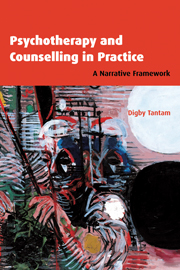Book contents
- Frontmatter
- Contents
- Preface
- A note on terminology
- Acknowledgements
- Introduction
- 1 Establishing the concerns
- 2 Values
- 3 What life means. Emotional flavour
- 4 Narrating the treatment: the formulation, reformulation and therapeutic contract
- 5 Narrating the self
- 6 Procedures for gaining relief
- 7 Resolution: finding out what's doing this to me
- 8 Universal technique for resolving predicaments
- 9 Relinquishment and releasement: changing something about me
- 10 Re-narration: finding happiness
- 11 Crises, and how to surmount them
- Appendix: confidential record
- References
- Index
9 - Relinquishment and releasement: changing something about me
Published online by Cambridge University Press: 06 November 2009
- Frontmatter
- Contents
- Preface
- A note on terminology
- Acknowledgements
- Introduction
- 1 Establishing the concerns
- 2 Values
- 3 What life means. Emotional flavour
- 4 Narrating the treatment: the formulation, reformulation and therapeutic contract
- 5 Narrating the self
- 6 Procedures for gaining relief
- 7 Resolution: finding out what's doing this to me
- 8 Universal technique for resolving predicaments
- 9 Relinquishment and releasement: changing something about me
- 10 Re-narration: finding happiness
- 11 Crises, and how to surmount them
- Appendix: confidential record
- References
- Index
Summary
This chapter is about addiction: why it is difficult to give up a way of life that has become destructive or to relinquish certain ways of reacting, including symptoms, which have gained a hold despite being unwanted. It is also about how people give up their addictions, and therefore about what therapists can do to help them. It will turn out that overcoming an addiction is rarely a matter of vanquishing it but more often a matter of giving in to a realization of the need for something bigger and more powerful than oneself, a process that Heidegger terms ‘releasement’ (von Deurzen, 1997). The word ‘addiction’ is used advisedly here, even though it is no longer fashionable. It has generally been replaced by the words ‘dependency’, as in chemical dependency, or by the term ‘misuse’, as in substance misuse. Dependency connotes a particular image of someone who is needy and dependent on other people. There is no evidence that these personality traits are particularly linked to becoming addicted, however. Misuse does not capture the imperative nature of the problem. Heroin, as an illicit substance, is misused every time that it is used. Yet there are people who manage to confine their heroin use to a level which they would not consider to be problematic. The ‘demandingness’ of heroin addiction – its admixture of pleasure and self-destruction – is not really conveyed by the much more neutral term, ‘misuse’, which could apply equally well to the recreational user.
- Type
- Chapter
- Information
- Psychotherapy and Counselling in PracticeA Narrative Framework, pp. 207 - 230Publisher: Cambridge University PressPrint publication year: 2002



